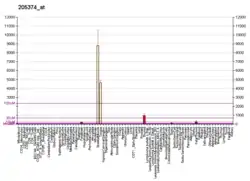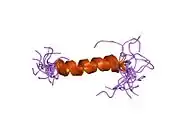Sarcolipin
Sarcolipin is a micropeptide protein that in humans is encoded by the SLN gene.[3][4]
Function
Sarcoplasmic reticulum Ca2+-ATPases are transmembrane proteins that catalyze the ATP-dependent transport of Ca2+ from the cytosol into the lumen of the sarcoplasmic reticulum in muscle cells. The SLN gene encodes a small transmembrane proteolipid that regulates several sarcoplasmic reticulum Ca2+-ATPases by reducing the accumulation of Ca2+ in the sarcoplasmic reticulum without affecting the rate of ATP hydrolysis.[4]
Ablation of sarcolipin increases atrial Ca2+ transient amplitudes and enhanced atrial contractility. Furthermore, atria from sarcolipin-null mice have blunted response to isoproterenol stimulation, implicating sarcolipin as a mediator of beta-adrenergic responses in atria.[5] Recently it has been shown that SLN is an important mediator of muscle based thermogenesis and loss of sarcolipin predisposes mice to diet-induced obesity thus suggesting its role in energy metabolism and regulation of weight gain [6]
References
- GRCh38: Ensembl release 89: ENSG00000170290 - Ensembl, May 2017
- "Human PubMed Reference:". National Center for Biotechnology Information, U.S. National Library of Medicine.
- Odermatt A, Taschner PE, Scherer SW, Beatty B, Khanna VK, Cornblath DR, Chaudhry V, Yee WC, Schrank B, Karpati G, Breuning MH, Knoers N, MacLennan DH (November 1997). "Characterization of the gene encoding human sarcolipin (SLN), a proteolipid associated with SERCA1: absence of structural mutations in five patients with Brody disease". Genomics. 45 (3): 541–53. doi:10.1006/geno.1997.4967. hdl:2066/25426. PMID 9367679.
- "Entrez Gene: SLN sarcolipin".
- Babu GJ, Bhupathy P, Timofeyev V, Petrashevskaya NN, Reiser PJ, Chiamvimonvat N, Periasamy M (November 2007). "Ablation of sarcolipin enhances sarcoplasmic reticulum calcium transport and atrial contractility". Proceedings of the National Academy of Sciences of the United States of America. 104 (45): 17867–72. doi:10.1073/pnas.0707722104. PMC 2077025. PMID 17971438.
- Bal NC, Maurya SK, Sopariwala DH, Sahoo SK, Gupta SC, Shaikh SA, Pant M et al.: Sarcolipin is a newly identified regulator of muscle-based thermogenesis in mammals. Nat Med, 2012. http://www.nature.com/nm/journal/vaop/ncurrent/full/nm.2897.html
- Asahi M, Sugita Y, Kurzydlowski K, De Leon S, Tada M, Toyoshima C, MacLennan DH (April 2003). "Sarcolipin regulates sarco(endo)plasmic reticulum Ca2+-ATPase (SERCA) by binding to transmembrane helices alone or in association with phospholamban". Proceedings of the National Academy of Sciences of the United States of America. 100 (9): 5040–5. doi:10.1073/pnas.0330962100. PMC 154294. PMID 12692302.
- Asahi M, Kurzydlowski K, Tada M, MacLennan DH (July 2002). "Sarcolipin inhibits polymerization of phospholamban to induce superinhibition of sarco(endo)plasmic reticulum Ca2+-ATPases (SERCAs)". The Journal of Biological Chemistry. 277 (30): 26725–8. doi:10.1074/jbc.C200269200. PMID 12032137.
Further reading
- Lanfranchi G, Muraro T, Caldara F, Pacchioni B, Pallavicini A, Pandolfo D, Toppo S, Trevisan S, Scarso S, Valle G (January 1996). "Identification of 4370 expressed sequence tags from a 3'-end-specific cDNA library of human skeletal muscle by DNA sequencing and filter hybridization". Genome Research. 6 (1): 35–42. doi:10.1101/gr.6.1.35. PMID 8681137.
- Odermatt A, Becker S, Khanna VK, Kurzydlowski K, Leisner E, Pette D, MacLennan DH (May 1998). "Sarcolipin regulates the activity of SERCA1, the fast-twitch skeletal muscle sarcoplasmic reticulum Ca2+-ATPase". The Journal of Biological Chemistry. 273 (20): 12360–9. doi:10.1074/jbc.273.20.12360. PMID 9575189.
- Smith WS, Broadbridge R, East JM, Lee AG (January 2002). "Sarcolipin uncouples hydrolysis of ATP from accumulation of Ca2+ by the Ca2+-ATPase of skeletal-muscle sarcoplasmic reticulum". The Biochemical Journal. 361 (Pt 2): 277–86. doi:10.1042/0264-6021:3610277. PMC 1222307. PMID 11772399.
- Mascioni A, Karim C, Barany G, Thomas DD, Veglia G (January 2002). "Structure and orientation of sarcolipin in lipid environments". Biochemistry. 41 (2): 475–82. doi:10.1021/bi011243m. PMID 11781085.
- Asahi M, Kurzydlowski K, Tada M, MacLennan DH (July 2002). "Sarcolipin inhibits polymerization of phospholamban to induce superinhibition of sarco(endo)plasmic reticulum Ca2+-ATPases (SERCAs)". The Journal of Biological Chemistry. 277 (30): 26725–8. doi:10.1074/jbc.C200269200. PMID 12032137.
- Minamisawa S, Wang Y, Chen J, Ishikawa Y, Chien KR, Matsuoka R (March 2003). "Atrial chamber-specific expression of sarcolipin is regulated during development and hypertrophic remodeling". The Journal of Biological Chemistry. 278 (11): 9570–5. doi:10.1074/jbc.M213132200. PMID 12645548.
- Asahi M, Sugita Y, Kurzydlowski K, De Leon S, Tada M, Toyoshima C, MacLennan DH (April 2003). "Sarcolipin regulates sarco(endo)plasmic reticulum Ca2+-ATPase (SERCA) by binding to transmembrane helices alone or in association with phospholamban". Proceedings of the National Academy of Sciences of the United States of America. 100 (9): 5040–5. doi:10.1073/pnas.0330962100. PMC 154294. PMID 12692302.
- Suzuki Y, Yamashita R, Shirota M, Sakakibara Y, Chiba J, Mizushima-Sugano J, Nakai K, Sugano S (September 2004). "Sequence comparison of human and mouse genes reveals a homologous block structure in the promoter regions". Genome Research. 14 (9): 1711–8. doi:10.1101/gr.2435604. PMC 515316. PMID 15342556.
- Rual JF, Venkatesan K, Hao T, Hirozane-Kishikawa T, Dricot A, Li N, Berriz GF, Gibbons FD, Dreze M, Ayivi-Guedehoussou N, Klitgord N, Simon C, Boxem M, Milstein S, Rosenberg J, Goldberg DS, Zhang LV, Wong SL, Franklin G, Li S, Albala JS, Lim J, Fraughton C, Llamosas E, Cevik S, Bex C, Lamesch P, Sikorski RS, Vandenhaute J, Zoghbi HY, Smolyar A, Bosak S, Sequerra R, Doucette-Stamm L, Cusick ME, Hill DE, Roth FP, Vidal M (October 2005). "Towards a proteome-scale map of the human protein-protein interaction network". Nature. 437 (7062): 1173–8. doi:10.1038/nature04209. PMID 16189514. S2CID 4427026.
- Vittorini S, Storti S, Parri MS, Cerillo AG, Clerico A (2007). "SERCA2a, phospholamban, sarcolipin, and ryanodine receptors gene expression in children with congenital heart defects". Molecular Medicine. 13 (1–2): 105–11. doi:10.2119/2006-00054.Vittorini. PMC 1869624. PMID 17515962.




